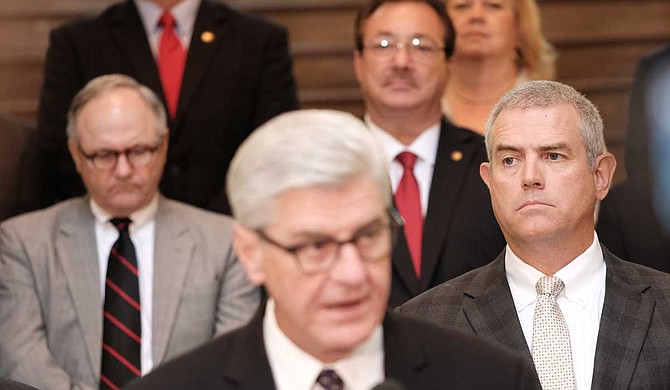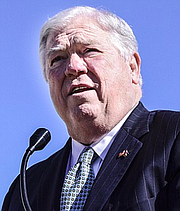Members of law enforcement, lawyers and advocates for victims of domestic violence are urging Mississippi House Speaker Philip Gunn to oppose the "Landowner Protection Act," because they claim it would place "a heavier burden" on law enforcement and lead to an increase in crime. Photo by Ashton Pittman.
JACKSON — Mississippi senators delighted the business community last week when they passed a bill to cut down on lawsuits against property owners, but strong opposition remains among law enforcement, advocates for victims of domestic violence and lawyers.
Senate Bill 2901, also known as the Landowners Protection Act, would protect property owners from being sued if a third party causes an injury on their property. Under the bill, a property owner would only be held liable if he or she "actively and affirmatively, with a degree of conscious decision-making, impelled the conduct of said third party."
House Bill 337, awaiting a vote in the other legislative chamber, is nearly identical.
If either becomes law, opponents say, businesses would no longer be as fearful of lawsuits and would spend less on security measures like surveillance, personnel and lighting. That, they say, would place a heavier burden on law enforcement.
The bill "would tell law enforcement officers that you appreciate their service," but that "you need them to do a little more, even though you know they are overworked and underpaid," Washington County Sheriff Milton Gaston Sr. wrote in a Feb. 4 letter addressed to House Speaker Philip Gunn and Lt. Gov. Tate Reeves. As lieutenant governor, Reeves also serves as president of the Mississippi Senate.
"You need them to micromanage everyone's property because it will save those who can afford to pay for their own insurance and protection even more money," he wrote.
'Law Enforcement Would Be Hampered in Solving Crimes'
In an undated letter to the Legislature last week, District Attorney Scott Colom expressed similar concerns, writing that such a law would be "antithetical" to his mission of "prosecuting violent crimes and offering suggestions to enhance the safety of my district."
He represents Mississippi's 16th Circuit Judicial District, which includes Lowndes, Oktibbeha, Clay and Noxubee counties.
"Shifting the burden of security to law enforcement strains their resources," he wrote. "Taxpayer-funded law enforcement simply cannot be expected to patrol, photograph, and document activity on every private premise with the same effectiveness they can with the assistance of private security measures such as excellent lighting, video cameras, signage, and where appropriate, foot patrol."
If businesses feel less urgency to provide their own security, "law enforcement would be hampered in solving crimes" like rape and child abduction, he continued, speculating that it could lead to "instances where a violent criminal may walk free due to insufficient evidence."
In a Feb. 2 letter, the Mississippi Coalition Against Domestic Violence was even more blunt.
"We are concerned that more vulnerable members of society, including women and children, would be particularly harmed if these bills pass," the letter reads. "These bills will make public places such as shopping malls, grocery stores, and gas stations more dangerous. Violent crimes such as abduction, rape, and murder will increase, as will property crimes and assaults."
Senators passed the bill last Thursday 32-17, with most Republicans in favor. On Facebook that evening, Sen. Brice Wiggins, R-Pascagoula, a former prosecutor, explained that he shared the same concerns as Colom, Gaston, and MCADV, and chose not to "go along with the crowd and outside interests."
The "outside interests" Wiggins alludes to include pro-business organizations like the National Federation of Independent Businesses, the Mississippi Association of Affordable Housing Providers and the Southwest Mississippi Board of Realtors, which traveled to the Mississippi Capitol on Feb. 8 to encourage representatives to pass the House version. The bill's principal author, Sen. Josh Harkins, R-Brandon, is a real-estate broker himself and a member of the Chamber of Commerce, which also supports his tort-reform bill.
Insurance companies also have an interest in the legislation, wrote Virginia Kramer, a criminal defense attorney in Quitman.
"Our local politicians and law enforcement officials oppose this bill, too," she wrote in a Feb. 6 Facebook post. "These insurance companies aren't patrolling our counties, they aren't watching over our jails, and they aren't present in our courtrooms," she wrote. "We are. And we know what's going to happen if this bill becomes law."
Political Deja Vu: Supporters Accuse 'The Trial Lobby' of Scare Tactics
Those concerns, the bills' supporters say, amount to little more than scare tactics pushed by another set of special interests—lawyers—who stand to lose money due to a decrease in litigation.
The charge is reminiscent of the Mississippi Legislature's passage of tort-reform legislation to limit lawsuit pay-outs and other business-friendly limits 16 years ago, when the issue was a nationwide Republican and U.S. Chamber priority. The push for tort reform received strong media support in Mississippi including friendly reporting from then-Clarion-Ledger reporter Jerry Mitchell with sensationalistic "Jackpot Justice" headlines.
In the early 2000s, the primary response to critics of tort reform also centered on "greedy trial attorneys," although that was not the whole story, as the Jackson Free Press reported extensively at the time.
Hoodwinked! Tort Reform's Political Saga in Mississippi
How "tort reform" succeeded in Mississippi—a mixture of political finger-pointing, scare tactics and one-sided reporting about "jackpot justice."
Then, national business lobbies also pushed for extensive limits to lawsuits and payouts, and tort reform has long been a way to limit the amount of money trial lawyers in Mississippi and beyond could contribute to Democratic candidates. It was a leveling of the playing field, of sorts, with the GOP, which has deep coffers among wealthy corporations on the other side of lawsuits, and helps fund the campaigns of pro-business judges in Mississippi. Tort reform was also a way to demonize candidates who did not support the lawsuit limits.
"The pursuit of tort reform became the most emotional and influential wedge issue Mississippi politics had spawned in thirty years, and it aided Republicans by separating business campaign contributions from Democrats and by drying up trial lawyer campaign contributions to Democrats," wrote Mississippi political strategists Jere Nash and Andy Taggart in their book, "Mississippi Politics: The Struggle for Power 1976-2006." Nash is a Democrat, and Taggart is a Republican.
The campaign for tort reform in the early 2000s often emphasized either directly or indirectly black plaintiffs getting large payouts—which tort-reform lobbyists referred to as "jackpot justice"—over other kinds of lawsuits and damages, thus playing on racist "freeloader" myths. Tort reform was a central issue for Mississippian Haley Barbour, the former chairman of the Republican National Committee, when he returned home from his lobbyist firm in Washington, D.C., for eight years to serve as governor.
"In a way that had not been accomplished since the civil rights movement, the tort reform initiative drew a line in the proverbial sand of Mississippi politics," Nash and Taggart continued. "Trial attorneys were on one side opposing tort reform, and businesses, joined by healthcare professionals, were on the other side advocating reform. A public official was forced to choose sides. There was no middle ground, no compromise. ... In post-tort reform Mississippi, the political dynamic has forever changed. For businesses and their political allies, a candidate who accepts contributions from trial lawyers becomes radioactive."
This year is also an election year in Mississippi.
Nash and Taggart openly admit in their book that media coverage in the state helped tort-reform fervor take hold in Mississippi, led by The Clarion-Ledger the year before this newspaper launched. "First, the state and national press turned against trial lawyers," they write in their book. "It started June 17, 2001, when Mississippians woke up to a front-page Clarion-Ledger headline, 'Hitting the Jackpot in Mississippi Courtrooms,'" announcing a series of articles about "Lotto-like verdicts, many of which are handed down in poor and rural counties, are enticing out-of-state lawyers and clients to sue here."
Jerry Mitchell's Ledger series then enticed similar national headlines, they write. "The term 'jackpot justice' soon become synonymous with the campaign to enact tort reform, and it become irresistible to the media," they write, leading to national headlines like "Jackpot Justice Is a Black Eye for State."
This newspaper's later coverage of the issue found that The Clarion-Ledger's reporting had leaned heavily toward the business lobby side in key ways. One was in the use of California as an example of lawsuit reforms working, but the coverage in the Ledger and elsewhere routinely left out that the lawsuit limits in California were coupled with the passage of Proposition 103, which mandated oversight of insurance companies and state approval of premium rates, which was not part of the reforms in Mississippi.
Both Mitchell and the newspaper's editorial board used California as an example of tort reform working several times without bringing in its insurance-reform component, even as other Gannett newspapers outside Mississippi had reported the entire story.
However, even business organizations that promised that tort reform then would lead to a better "business climate" then later complained about lack of improvement. Tort reform, however, continued to be near the top of GOP business agendas.
Bryant: 'Landowners Need This Protection'
One of this year's House bill's early opponents, Madison County Sheriff Randall Tucker, reneged in a Feb. 6 letter to lawmakers after speaking to "responsible members of the business community that assure me the proposed measures will help the business climate of Mississippi."
"In the interim, I have learned that the proposed legislation referenced above deals with civil court cases and does not affect a property owner's obligation to reasonably keep its property safe," he wrote.
Still, the fear of a civil lawsuit can ensure the property owners have adequate security mechanisms in place.
Mississippi Gov. Phil Bryant expressed his support for the bill and thanked Tucker on Twitter.
"Thanks, Sheriff Tucker," Bryant tweeted on Feb. 6. "I hope this bill makes it to my desk so I can sign it. Landowners need this protection."
Bryant included a link to a tweet from Y'all Politics that accused "the trial lobby" of putting "massive pressure on law enforcement" to oppose the bills.
The bill's opponents include not only attorneys like Kramer and Wiggins, but also the Mississippi Association for Justice, a trial lawyers' association.
Another attorney who opposes the bill is Democratic House Minority Leader David Baria, who is part owner of a law firm in his hometown of Bay St. Louis and, back in 2003, was a leader in the trial lawyers' association. On the Baria-Jones, PLLC Facebook page, a Feb. 3 post warned that the bill would "lead to more crime, including human trafficking, child molestation, and abductions" and "create pockets of safe zones for criminals to literally get away with murder and put unprecedented pressure on law enforcement."
Lawmakers have yet to set a date for a vote on the House bill.
Follow state reporter Ashton Pittman on Twitter @ashtonpittman. Email story tips to ashton@jacksonfreepress.com. Donna Ladd contributed to this story.
More like this story
- GOP Kills Tort Reform Amendment Requiring 'Reasonable' Safety Efforts
- AG Candidates Praise 'Heartbeat Bill,' Anti-LGBT Laws, Tort Reform
- Wealthy Doctors' PAC, 'I.V. League' Help Tate Reeves Lead in Campaign Donations
- Voting Rights Act Denied Mississippi Its 'Sovereignty,' AG Candidate Says
- Legislative Update: Tort Reform, Heartbeat Bills, Teacher Pay Moves Forward
More stories by this author
- Governor Attempts to Ban Mississippi Abortions, Citing Need to Preserve PPE
- Rep. Palazzo: Rural Hospitals ‘On Brink’ of ‘Collapse,’ Need Relief Amid Pandemic
- Two Mississippi Congressmen Skip Vote on COVID-19 Emergency Response Bill
- 'Do Not Go to Church': Three Forrest County Coronavirus Cases Bring Warnings
- 'An Abortion Desert': Mississippi Women May Feel Effect of Louisiana Case





Comments
Use the comment form below to begin a discussion about this content.